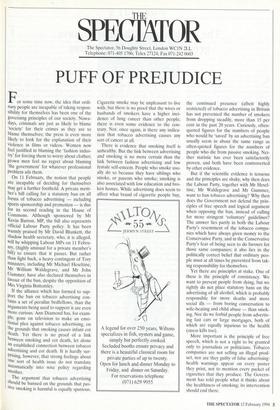SPECT Thw AT OR
The Spectator, 56 Doughty Street, London WCIN 2LL Telephone: 071-405 1706; Telex 27124: Fax 071-242 0603
PUFF OF PREJUDICE
For some time now, the idea that ordi- nary people are incapable of taking respon- sibility for themselves has been one of the governing principles of our society. Nowa- days, criminals are just as likely to blame 'society' for their crimes as they are to blame themselves; the press is even more likely to look for the explanation of their violence in films or videos. Women now feel justified in blaming the 'fashion indus- try' for forcing them to worry about clothes; grown men feel no regret about blaming 'the government' for whatever professional problem ails them.
On 11 February, the notion that people are incapable of deciding for themselves may get a further foothold. A private mem- ber's bill calling for a statutory ban on all forms of tobacco advertising — including sports sponsorship and promotion — is due for its second reading in the House of Commons. Although sponsored by Mr Kevin Barron, MP, the bill also represents official Labour Party policy. It has been warmly praised by Mr David Blunkett, the shadow health secretary, who, it is alleged, will be whipping Labour MPs on 11 Febru- ary, (highly unusual for a private member's bill) to ensure that it passes. But rather than fight back, a heavy contingent of Tory ministers, including Mr Michael Heseltine, Mr William Waldegrave, and Mr John Gummer, have also declared themselves in favour of the ban, despite the opposition of Mrs Virginia Bottomley.
If the alliance which has formed to sup- Port the ban on tobacco advertising con- tains a set of peculiar bedfellows, than the arguments being used to support it are even more curious. Ann Diamond has, for exam- ple, gone on television to make an emo-
tional plea against tobacco advertising, on the grounds that smoking causes infant cot
death. Yet there is no proof of a link between smoking and cot death, let alone an established connection between tobacco advertising and cot death. It is hardly sur- prising, however, that strong feelings about One sort of health issue do not translate automatically into wise policy regarding another.
The argument that tobacco advertising should be banned on the grounds that pas- sive smoking is harmful is equally spurious Cigarette smoke may be unpleasant to live with, but there is no proof that the wives or husbands of smokers have a higher inci- dence of lung cancer than other people; there is even some evidence to the con- trary. Nor, once again, is there any indica- tion that tobacco advertising causes any sort of cancer at all.
There is evidence that smoking itself is unhealthy. But the link between advertising and smoking is no more certain than the link between fashion advertising and low female self-esteem. People who smoke usu- ally do so because they have siblings who smoke, or parents who smoke; smoking is also associated with low education and bro- ken homes. While advertising does seem to effect what brand of cigarette people buy, the continued presence (albeit highly restricted) of tobacco advertising in Britain has not prevented the number of smokers from dropping steadily, more than 15 per cent in the past 20 years. Curiously, often- quoted figures for the numbers of people who would be 'saved' by an advertising ban usually seem in about the same range as often-quoted figures for the numbers of people who die from passive smoking. Nei- ther statistic has ever been satisfactorily proven, and both have been controverted by other evidence.
But if the scientific evidence is tenuous and the principles are shaky, why then does the Labour Party, together with Mr Hesel- tine, Mr Waldegrave and Mr Gummer, want to ban tobacco advertising? Why then does the Government not defend the prin- ciples of free speech and logical argument when opposing the ban, instead of calling for more stringent 'voluntary' guidelines? The answer lies partly in both the Labour Party's resentment of the tobacco compa- nies which have always given money to the Conservative Party, and in the Conservative Party's fear of being seen to do favours for those same companies; it also lies in the politically correct belief that ordinary peo- ple must at all times be prevented from tak- ing responsibility for themselves.
Yet there are principles at stake. One of these is the principle of consistency. We want to prevent people from dying, but we rightly do not place statutory bans on the advertising of all alcohol, which is probably responsible for more deaths and more social ills — from boring conversation to wife-beating and child abuse — than smok- ing. Nor do we forbid people from advertis- ing fast cars or large mortgages, both of which are equally injurious to the health (stress kills too).
More important is the principle of free speech, which is not a right to be granted only to journalists or politicians. Tobacco companies are not selling an illegal prod- uct, nor are they guilty of false advertising: health warnings appear on every poster they print, not to mention every packet of cigarettes that they produce. The Govern- ment has told people what it thinks about the healthiness of smoking; its intervention should end there.


















































 Previous page
Previous page